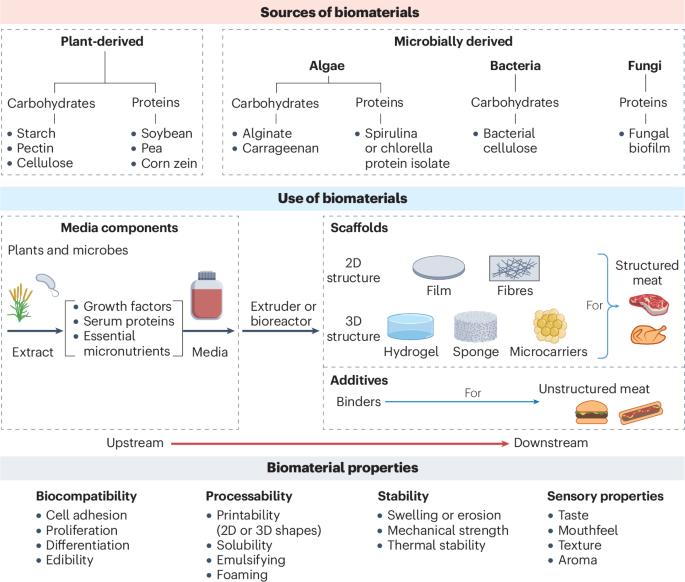Biomaterials in cellular agriculture and plant-based foods for the future
IF 86.2
1区 材料科学
Q1 MATERIALS SCIENCE, MULTIDISCIPLINARY
引用次数: 0
Abstract
Alternative food products are needed to address the most pressing challenges faced by the food industry: growing global food demand, health concerns, animal welfare, food security and environmental sustainability. Future foods are defined as foods with scalability and sustainability potential owing to rapidly advancing technological developments in their production systems. Key areas of study for future foods include cellular agriculture and plant-based systems, which include biomaterials as key ingredients or as structural components to impart texture, support cell growth and metabolism, and provide nutrients and organoleptic factors to food products. This Review discusses current requirements, options and processing approaches for biomaterials with utility in future foods. We focus on two main approaches: cellular agriculture wherein the cells are the key component for food (with the biomaterials utilized to support the cells via adherence and/or for texture) and plant-based foods wherein acellular plant-derived biomaterials are the food components. In both cases, the same fundamental challenges apply for the biomaterials: achieving utility at scale and low cost while meeting food safety requirements. Other considerations for biomaterials for future foods are also addressed, including sustainability, modelling, consumer acceptance, nutrition, regulatory status and safety considerations to highlight the path ahead. This emerging field of biomaterials for future foods offers a new generation of biomaterial systems that can positively impact human health, environmental sustainability and animal welfare. Although scaling these biomaterial sources cost-effectively presents a major challenge, substantial progress is being made, and opportunities to establish supply chains are already underway. Biomaterials have a crucial role in the development of future foods, particularly in cellular agriculture and plant-based systems. This Review addresses the current status and future requirements of biomaterials for future foods, addressing key aspects such as structure, nutrition, safety, sensory attributes, sustainability and consumer preferences.


未来细胞农业和植物性食品中的生物材料
需要替代食品来解决食品工业面临的最紧迫挑战:不断增长的全球食品需求、健康问题、动物福利、粮食安全和环境可持续性。未来食品被定义为具有可扩展性和可持续性潜力的食品,因为其生产系统的技术发展迅速。未来食品的关键研究领域包括细胞农业和基于植物的系统,其中包括生物材料作为关键成分或结构成分来赋予质地,支持细胞生长和代谢,并为食品提供营养和感官因子。这篇综述讨论了生物材料在未来食品中应用的当前要求、选择和加工方法。我们专注于两种主要方法:细胞农业,其中细胞是食物的关键成分(利用生物材料通过粘附性和/或质地来支持细胞)和植物性食品,其中非细胞植物性生物材料是食物成分。在这两种情况下,同样的基本挑战适用于生物材料:实现大规模和低成本的效用,同时满足食品安全要求。未来食品中生物材料的其他考虑因素也得到了解决,包括可持续性、模型、消费者接受度、营养、监管状况和安全考虑,以突出未来的道路。这一用于未来食品的生物材料新兴领域提供了新一代生物材料系统,可以对人类健康、环境可持续性和动物福利产生积极影响。尽管经济有效地扩展这些生物材料来源是一项重大挑战,但正在取得实质性进展,并且已经有机会建立供应链。
本文章由计算机程序翻译,如有差异,请以英文原文为准。
求助全文
约1分钟内获得全文
求助全文
来源期刊

Nature Reviews Materials
Materials Science-Biomaterials
CiteScore
119.40
自引率
0.40%
发文量
107
期刊介绍:
Nature Reviews Materials is an online-only journal that is published weekly. It covers a wide range of scientific disciplines within materials science. The journal includes Reviews, Perspectives, and Comments.
Nature Reviews Materials focuses on various aspects of materials science, including the making, measuring, modelling, and manufacturing of materials. It examines the entire process of materials science, from laboratory discovery to the development of functional devices.
 求助内容:
求助内容: 应助结果提醒方式:
应助结果提醒方式:


